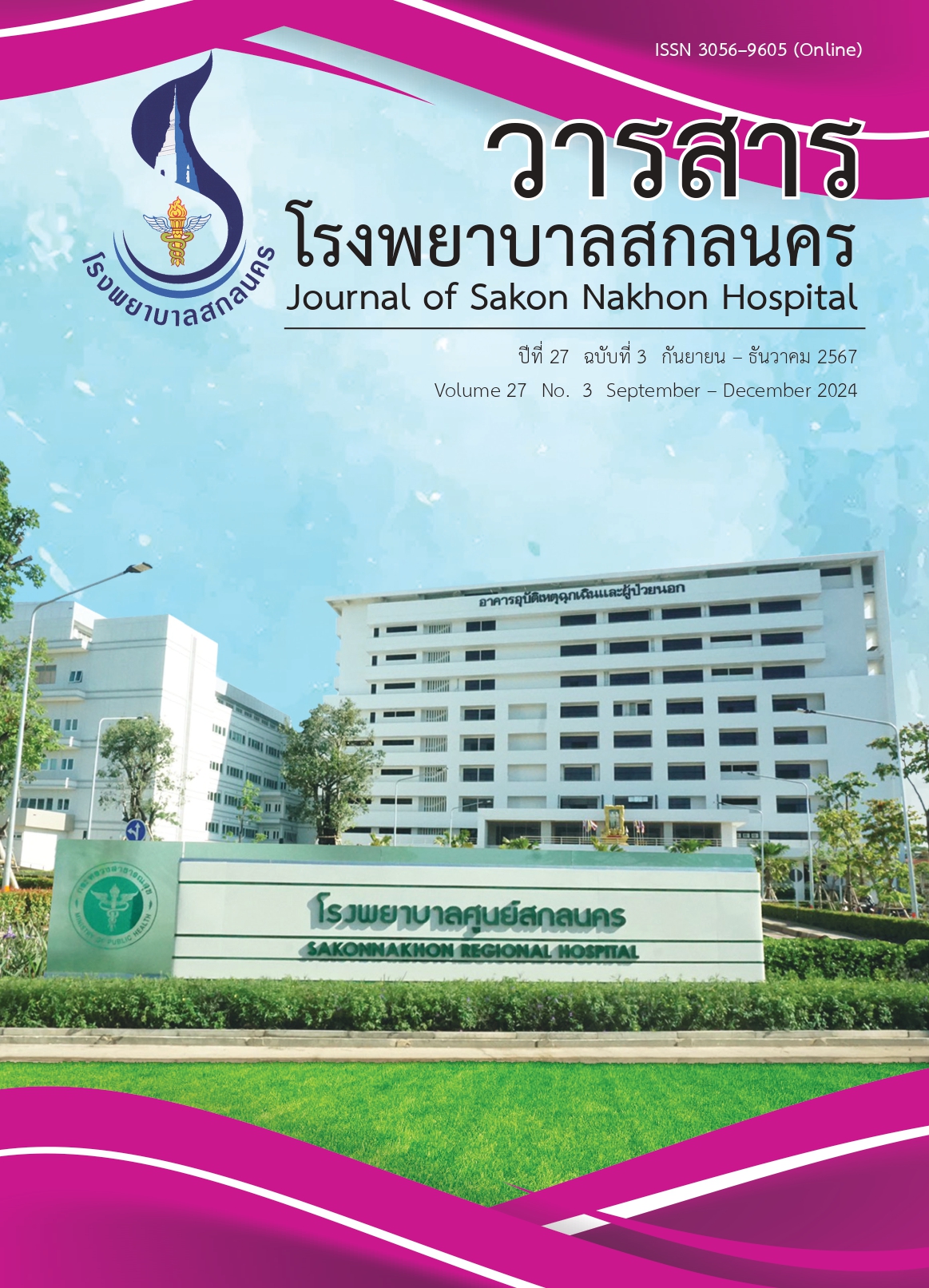The Development Model for Enhancing Capabilities of Caregivers for Dependent Elderly in the New Normal Era
Keywords:
Caregivers, Dependent ElderlyAbstract
The purpose of this study was to develop and study the effectiveness of the development model for enhancing capabilities of caregivers for dependent elderly in the new normal era. The samples were selected using a multi-stage random sampling, consisting of: 1) 30 caregivers who completed at least 70 hours of elderly care training and had at least 1 year of experience in caring for dependent elderly, 2) 30 dependent elderly with Activities of Daily Living (ADL) scores between 0-11, and 3) 30 family members of dependent elderly. Data were collected using the personal information questionnaires, knowledge assessment forms, perception of caregiver role questionnaires, role satisfaction of caregiver questionnaires, elderly ADL assessment forms, and family satisfaction questionnaires. The overall reliability coefficient of instrument was 0.87. Data were analyzed using descriptive statistics and t-test.
The research findings revealed that the development model for enhancing capabilities of caregivers for dependent elderly comprised: 1) enhancement of knowledge in elderly care, which included health and illness assessment, assessment of problems and needs of dependent elderly and infection prevention and control in the new normal era, 2) development of elderly care skills, including daily care for dependent elderly, specific care activities such as: pressure ulcer wound care, nasogastric tube feeding and physical rehabilitation, 3) development of communication skills and teamwork and 4) empowerment and coping strategy development for caregivers. After model implementation, the caregivers showed significantly improved knowledge, role perception, and role satisfaction, and the family members had significantly higher satisfaction with caregivers' performance (p < 0.05). However, there was no significant difference in the elderly's ADL scores before and after model implementation.
Research recommendations suggest continuous development of caregivers' capabilities to enhance their potential and confidence in performing their roles. Long-term effectiveness studies of the model should be conducted, and the research should be expanded to nearby areas to develop a model suitable for all contexts.
References
จินตนา อาจสันเที๊ยะ, และรัชณีย์ ป้อมทอง. แนวโน้มการดูแลผู้สูงอายุในศตวรรษที่ 21: ความท้าทายในการพยาบาล. ว. พยาบาลทหารบก 2561;19(1):39-49.
ณปภา ประยูรวงษ์. สถานการณ์แนวโน้มและการดูแลส่งเสริมสุขภาพผู้สูงอายุกลุ่มติดเตียงประเทศไทย. ว. ศาสตรสาธารณสุขและนวัตกรรม 2565;2(2):14-25.
จิตรกร วนะรักษ์. การพัฒนารูปแบบการดูแลสุขภาพผู้สูงอายุติดบ้านติดเตียงโดยการมีส่วนร่วมของชมรมจริยธรรม. ว. วิชาการสาธารณสุข 2564;30(2):285-294.
ณปภา ประยูรวงษ์. สถานการณ์แนวโน้มและการดูแลส่งเสริมสุขภาพผู้สูงอายุกลุ่มติดเตียงประเทศไทย. ว. ศาสตร์สาธารณสุขและนวัตกรรม 2565;2(2):14-25.
วิยะดา รัตนสุวรรณ, และปะราลี โอภาสนันท์. การพัฒนารูปแบบการเสริมสร้างศักยภาพผู้ดูแลผู้สูงอายุที่มีภาวะพึ่งพิงในชุมชน. ว. การพยาบาลและการศึกษา 2561;11(4):156-174.
สำนักอนามัยผู้สูงอายุ กรมอนามัย. คู่มือการดำเนินงาน ตัวชี้วัด: ร้อยละของประชากรสูงอายุที่มีพฤติกรรมสุขภาพที่พึงประสงค์ ประจำปี 2563 [อินเทอร์เน็ต]. [เข้าถึงเมื่อ 19 มกราคม 2567]. เข้าถึงได้จาก: https://hpc6.anamai.moph.go.th/th/slow-down-aging/download
อรวรรณ ศรีเกิน, มิ่งขวัญ ภูหงษ์ไทย, พรรณิภา ไชยรัตน์. การพัฒนาแนวทางอาสมัครดูแลผู้สูงอายุ (Care giver) ในการดูแลระยะยาว สำหรับผู้สูงอายุที่มีภาวะพึ่งพิง. ว. สำนักงานสาธารณสุขจังหวัดขอนแก่น 2561;1(2):39-54.
เยาวภา สีดอกบวบ, พะเยา พรมดี, ขวัญจิต คงพุฒิคุณ, และธนาภา ฤทธิวงษ์. ศึกษาประสิทธิผลของโปรแกรมพัฒนาสมรรถนะผู้ดูแลผู้สูงอายุที่มีภาวะพึ่งพิง อำเภอเมือง จังหวัดหนองบัวลำภู. ว. วิจัยทางวิทยาศาสตร์สุขภาพ 2566;17(2):99-101.
ขนิษฐา ก่อสัมพันธ์กุล. ศึกษาประสิทธิผลโปรแกรมพัฒนาทักษะผู้ดูแลในการฟื้นฟูสมรรถภาพผู้สูงอายุที่ภาวะพึ่งพิงเขตอำเภอแม่สอด จังหวัดตาก. ว. วิทยาศาสตร์สุขภาพและการสาธารณสุขชุมชน 2561;2(2):26-37.
วิภา สุวรรณรัตน์, เจตจรรยา บุญญกูล, และมาลี เกตแก้ว. การส่งเสริมสุขภาพจิตผู้สูงอายุในสถานการณ์ระบาดของโรค COVID-19. ว. วิจัยการพยาบาลและสุขภาพ 2565;23(3):117-131.
กาญจนา ปัญญาธร, เพชรา ทองเผ้า, มณีรัตน์ ปัจจะวงษ์, สุกัลยาณี สิงห์สัตย์, และจิราวรรณ บรรณบดี. สถานการณ์ ปัญหาและความต้องการในการดูแลผู้สูงอายุป่วยเรื้อรังติดเตียง ในช่วงที่มีการระบาดของโรคโควิด-19 ของชุมชนจังหวัดอุดรธานี. ว. การพยาบาลและการดูแลสุขภาพ 2564;40(1):16-25.
กระทรวงสาธารณสุข. คู่มือการคัดกรองและประเมินสุขภาพผู้สูงอายุ พ.ศ. 2564 [อินเทอร์เน็ต]. [เข้าถึงเมื่อ 19 มกราคม 2567]. เข้าถึงได้จาก http://www.tako.moph.go.th/takmoph2016/filedownload/file_20210129131952.pdf
ชลการ ทรงศรี, กิตติพร โพธิทากูล, สุวัฒน์ ทรงศรี, อาคม นามบุรี, และกาญจนา ปัญญาธร. บทเรียนการดำเนินงานระบบการดูแลระยะยาวด้านสาธารณสุขสำหรับผู้สูงอายุที่มีภาวะพึ่งพิงในระบบหลักประกันสุขภาพแห่งชาติ. ว. โรงพยาบาลสกลนคร 2563;23(2):77-90.
ศศิธร สุขจิตต์ จงรัก ดวงทองและวรวุฒิ ธุวะคำ. ศึกษารูปแบบการพัฒนาศักยภาพผู้ดูแลผู้สูงอายุแบบมีส่วนร่วมของภาคีเครือข่ายชุมชน ตำบลป่าเซ่า อำเภอเมือง จ.อุตรดิตถ์. ว. สภาการสาธารสุขชุมชน 2563;3(2):109-118.
ศิวัช ปิยะรัตนวัฒน์. ศึกษาศักยภาพผู้ช่วยเหลือดูแลผู้สูงอายุที่มีภาวะพึ่งพิง ตำบลวังตะกู อำเภอเมือง จ.นครปฐม. ว. สิ่งแวดล้อมศึกษาการแพทย์และสุขภาพ 2567;9(2):21-27.
Downloads
Published
How to Cite
Issue
Section
License
บทความที่ตีพิมพ์ถือว่าเป็นลิขสิทธิ์ของวารสารโรงพยาบาลสกลนคร การคัดลอกเพื่อพัฒนาเชิงวิชาการต้องได้รับการอ้างอิงอย่างถูกต้อง






